News
Cicilline touts Equality Act as House’s new senior gay member
Cicilline talks Equality Act in new role as senior LGBT House member
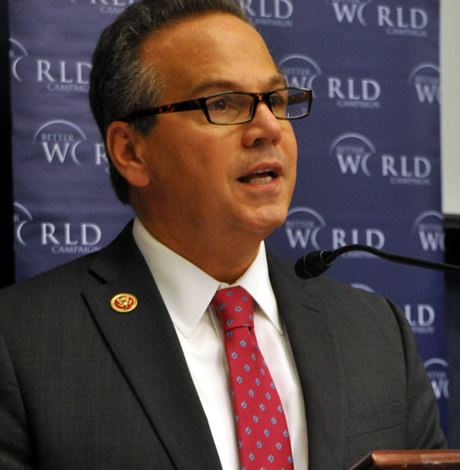
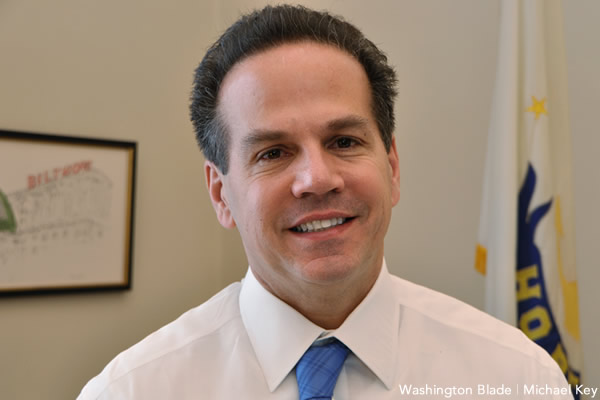
Rep. David Cicilline (D-R.I.) will become the most senior openly gay member of the U.S. House as Democrats take the majority this week. (Washington Blade file photo by Michael Key)
Rep. David Cicilline (D-R.I.) will become the most senior openly gay member of the U.S. House as Democrats take the majority this week, but he’s more excited about the growing ranks of openly LGB people who will serve in Congress alongside him and finally being able to move long-awaited legislation to ban anti-LGBT discrimination.
Asked by the Blade during an interview in his office Dec. 20 about his new distinction as the most senior out gay member of the House with outgoing Rep. Jared Polis leaving to become governor of Colorado, Cicilline said he’s “very proud” the chamber will have a net gain of two out LGB members in the 116th Congress and talked about the Equality Act.
“It’s a great privilege to be a part of that group,” Cicilline said. “I think this year will be an opportunity for us to finally move forward on the Equality Act, which I think is the single most important piece of legislation to our community in terms of, once and for all, prohibiting discrimination against members of the LGBT community as a matter of federal law. And so, I’m honored to be the senior most member and really excited about the new colleagues that are joining this caucus.”
(Although Cicilline is now the most senior openly gay person in the House, he’s not the most senior openly gay person in Congress. That distinction belongs to Sen. Tammy Baldwin of Wisconsin who was first elected to the House in 1998, but moved to the Senate and won re-election last year.)
The Equality Act would amend the Civil Rights Act of 1964 and the Fair Housing Act to ban anti-LGBT discrimination in employment, housing, public accommodations, jury service, education, federal programs and credit.
The bill also seeks to update federal law to include sex in the list of protected classes in public accommodation in addition to expanding the definition of public accommodations to include retail stores, banks, transportation services and health care services. Further, the Equality Act would establish that the Religious Freedom Restoration Act — a 1994 law aimed at protecting religious liberty — can’t be used to enable anti-LGBT discrimination.
Although the ongoing government shutdown will likely be the first priority for the Democratic majority, Nancy Pelosi said advancing the Equality Act would be a personal goal and the legislation will receive a bill number between 2 and 10.
And the lawmaker who’ll spearhead that legislation is Cicilline, who introduced the comprehensive non-discrimination measure in the previous two Congresses with Sen. Jeff Merkley (D-Ore.). For the first time, Democrats will introduce the Equality Act while controlling at least one chamber of Congress, which presents an opportunity for a floor vote on the legislation.
Cicilline said the timing for introduction for the Equality Act in the 116th Congress is yet to be determined, although it’ll definitely coincide with Merkley’s introduction of the legislation in the Senate. The Rhode Island Democrat said conversations with Democratic leadership on the timing for the legislation haven’t yet taken place “other than knowing we’re moving forward on it.”
“I know that the incoming speaker had made public statements about our intention to make the Equality Act a priority, which I’m delighted to hear,” Cicilline said.
Cicilline said he expects committees with jurisdiction over the Equality Act — such as the Judiciary Committee and the Education & the Workforce Committee — to hold hearings on the legislation before moving forward in accordance with regular order before the floor vote.
The next iteration of the Equality Act will have “pretty much” the same language as its previous iterations, Cicilline said. He added every time he reintroduces a piece of legislation “it’s another occasion to kind of look at the bill and see if there’s anything to change.”
“So we’ll go through that process, but it’ll be essentially the same bill,” Cicilline added.
Asked whether he had anything in mind that would make the Equality Act not the same in the 116th Congress, Cicilline replied, “No.”
In the previous Congress, all members of the Democratic caucus were co-sponsors of the legislation, except for two lawmakers: Rep. Dan Lipinski (D-Ill.), whom LGBT groups sought (unsuccessfully) to oust during the Democratic primary last year for not backing LGBT rights, and Rep. Marcia Fudge (D-Ohio).
Cicilline said he expects the same level of support in the Democratic caucus as it takes the majority in the 116th Congress.
“I’ve talked to a number of my new colleagues about the Equality Act, a number of them have already contacted me about wanting to be co-sponsor, so I expect will have the same kind of overwhelming Democratic support,” Cicilline said. “Hopefully, every Democrat will be a co-sponsor.”
Republicans however, are a different story. Only two Republicans co-sponsored the Equality Act in the last Congress. One of them is Rep. Ileana Ros-Lehtinen (R-Fla.), known for being the most pro-LGBT House Republican, who retired after 24 years in Congress. The other Republican co-sponsor, Rep. Scott Taylor (R-Va.), was voted out of office in the Democratic “blue” wave.
Cicilline said he’s had conversations on the Republican side of the aisle about the Equality Act and is “going to continue those because I want to do everything I had to make it bipartisan.
“I think it’ll be really important to have some of our Republican colleagues, but I don’t have any yet that are committed to it,” Cicilline added.
Asked whether there were any Republican possibilities he could name, Cicilline demurred.
“If I name them, they become less possible,” Cicilline said. “I’m going to explore with as many Republican colleagues as I can and get them on board.”
But the Equality Act also faces concerns among civil rights supporters. Many civil rights groups, including the Leadership Council on Civil & Human Rights, have said they support the goals of the Equality Act, but have stopped short of a full endorsement of the bill.
Fudge, who was considering a leadership challenge to Pelosi after Democrats won their majority, has expressed concerns about opening the Civil Rights Act to amendments on the House floor, where the landmark legislation could be watered down.
“What I opposed was including the Equality Act in the current Civil Rights Act,” Fudge said in a statement. “The Civil Rights Act is over 50 years old and isn’t even adequate to protect the people currently in it. I want us to do a new and modern civil rights bill that protects the LGBTQ community and updates protections for this era. I do not believe it is appropriate to open and relitigate the current Civil Rights Act.”
Cicilline said the Leadership Council on Civil & Human Rights made “a very strong statement of support of equality for our community” in regards to the Equality Act. As for Fudge’s concerns, Cicilline said he understands them, but doesn’t share them.
“I understand the argument advanced by Congresswoman Fudge,” Cicilline said. “I disagree with it. I think that we can’t have full equality by having a separate but equal civil rights bill.”
Cicilline said barring discrimination against LGBT people by amending the Civil Rights Act of 1964 has significant benefits that a different bill couldn’t accomplish. Among these benefits is applying more than 50 years of jurisprudence of the landmark law to anti-LGBT discrimination.
“Really the only way to do it is to include it in the existing civil rights architecture, so you have the benefit of all that jurisprudence whenever exemptions exist, whenever other kinds of tests need to be applied,” Cicilline said. “There’s significant jurisprudence on it, and so it saves kind of litigating all these things again. So, I think there’s real value legally and real value in terms of making a strong statement that we need for equality.”
Cicilline pointed out that every other member of the Congressional Black Caucus was a co-sponsor of the Equality Act, including civil rights icon Rep. John Lewis (D-Ga.), whom Cicilline said was “one of the early champions of the bill, and he’s a respected leader in that community.”
After the Equality Act passes the House, the game changes. Instead of a new Democratic majority, the U.S. Senate under Senate Majority Leader Mitch McConnell (R-Ky.) has an expanded Republican majority. Moreover, President Trump would need to sign any legislation for it to become law.
But Cicilline denied passage of the Equality Act in the House is the end of the story. In fact, he called it the “beginning of the story” because the campaign to pressure Republicans to support LGBT rights will begin.
“We will work hard to get it passed in the Senate,” Cicilline said. “I think this is one where it’s very critical for outside groups to play a role in identifying who are the key senators who are at least willing to consider supporting the Equality Act and that they hear from constituents in their districts from the LGBT community and allies about the importance of this, and we begin a real campaign to persuade them to do it.”
Referencing polls showing the American public opposes discrimination against LGBT people, Cicilline said the issue “is one where the American people are way ahead of us overwhelmingly.”
“I think part of our challenge is to catch up to where the American people are,” Cicilline said. “They understand fundamentally that discrimination is wrong. It’s antithetical to the fabric that is this country. And when you give them the examples of the kind of discrimination we’re talking about they’re opposed to it. So I think this is about kind of Congress basically catching up to where the rest of the country is and making certain that qualified people cannot be fired from their jobs, cannot be kicked out of housing.”
Cicilline also wouldn’t rule out Trump supporting the Equality Act, recalling an interview Trump gave in 2000 to The Advocate in which he said he likes the idea of adding sexual orientation to the Civil Rights Act of 1964. Trump hasn’t said whether he still holds that position.
“It’s hard to know that he’ll continue to maintain that position, especially when you think of the ways the administration has behaved, but if we bill pass the bill soon, that’s our next effort,” Cicilline said.
The third branch of the U.S. government may also have a chance to weigh in on anti-LGBT discrimination. Two petitions are pending before the Supreme Court calling on justices to affirm anti-gay discrimination amounts to sex discrimination under current law, and another petition seeks clarification on whether anti-trans discrimination is sex discrimination.
For decades, courts have more or less consistently found anti-trans discrimination is sex discrimination. Court rulings finding anti-gay discrimination is sex discrimination are a relatively new development, but a growing number of them are reaching that conclusion.
In the event the Supreme Court decides to take up these cases, Cicilline said either way justices would come down, it wouldn’t change the need for the Equality Act.
“It’s one tiny piece of this bill,” Cicilline said. “So it would answer that question, but if it was answered and said it is covered that would be great because we have some partial coverage, partial protection against discrimination for one part of the community but it doesn’t solve the problem and it would still, I think, wouldn’t in any way undermine the necessity of passing and enacting the Equality Act. If they rule against it, then it just affirms the emergency of passing the Equality Act. So, I don’t know that it has a big impact.”
The Equality Act isn’t the only LGBT issue Cicilline has spearheaded. Last year, when the nation was horrified over the Trump administration’s “zero tolerance” immigration policy that separated asylum-seekers from their children, Cicilline pointed out the LGBTQ youth in immigration detention facilities have no legal protections.
Cicilline said “there may, in fact, be some implications of the Equality Act” in the context of immigration detention in terms of if there were educational facilities or it was considered a public accommodation.
“They did not have in place any protocols or systems,” Cicilline said. “They acknowledged that when issues arise related to the sexual orientation or gender identity of youth they deal with it on a case-by-case basis, whatever that means. But it was clear there aren’t established protocols that protect this vulnerable population. This is one of many, many shortcoming in the current immigration detention proceedings.”
The treatment of LGBT youth in immigration detention facilities, Cicilline said, will be the subject of congressional oversight with the House under Democratic control.
“I think you’ll see a lot of oversight hearings on this when we take the majority in January,” Cicilline said.
That isn’t the only LGBT issue facing expected congressional oversight for Cicilline, who identified other areas he predicts will come under scrutiny.
“The same things that exist in the immigration system context exist in the criminal justice system, so protections are in place for the people in our community who are incarcerated,” Cicilline said. “There’s lots of work that needs to be done in terms of protecting students, particularly with Betsy DeVos’ rollback of some key protections.”
One LGBT issue that has reemerged is reports of anti-gay human rights abuses, including the extrajudicial killing of gay people in concentration camps, in the Russian semi-autonomous Republic of Chechnya. Last month, the State Department promoted a report from the Organization for Security for Cooperation in Europe corroborating those reports and finding Russia “appears to support the perpetrators rather than the victims.”
Cicilline said the report “confirmed what we suspected from the beginning” and found an earlier Russian investigation that found no abuse “was not legitimate.”
“We have attempted in a variety of different ways to raise that issue both by introducing and passing a resolution in Congress condemning that action as well as leading a letter to the president and secretary of state urging him to raise this issue with — abuse of LGBT people in Chechnya — with the Russian officials,” Cicilline said. “So this confirms what we have attempted to do and sadly is just another example of people from our community suffering violence and discrimination and brutality and really unforgiveable circumstances.”
The Trump administration has sanctioned Chechen leader Ramzan Kadyrov under the Magnitsky Act and supported the OSCE report, but Trump himself has said nothing about the abuses, unlike other world leaders such as Justin Trudeau, Theresa May, Emmanuel Macron and Angela Merkel.
Asked what the Trump administration or new House majority should do, Cicilline said “we just have to continue to press for human rights,” raising the possibility of legislation and sanctions.
“I think there’s some legislative stuff we can do,” Cicilline said. “I think we should continue to bring attention to these issues, continue to express condemnation when appropriate with sanctions, etc. So I think there’s a whole range of options available to us, but raising our voices and making sure that America continues to be a country that speaks out against violence against the LGBT community is really important.”
Asked what would need to happen to trigger sanctions, Cicilline said “we have current mechanisms,” but other proposals are in the works through the legislative process.
With a Democratic majority taking control of the House, Cicilline said the distinction between Democrats and Republicans on LGBT rights will exemplify the new tone in Washington.
“I think the contrast is really stark and, I think people have a right to expect that the Democrats who take the House back that LGBT equality and protecting the LGBT community from discrimination will be an important priority for us and, I think, the community should be excited about having at least one chamber that fundamentally respects who we are and is committed to fighting for our equality,” Cicilline said.
Although the House is just one chamber of Congress and Trump still occupies the White House, Cicilline said the distinction between Democrats and Republicans on LGBT rights will shine a light for the American public in time for the 2020 election.
“So this is a big change and we’re either going to get the Equality Act passed in the Senate after it passes the House and have equality, or we’re not,” Cicilline said. “And we’re going to be able to demonstrate who stopped our fight for equality, and those people will be on the ballot in two years.”
Cicilline added, “Our community will work to elect people who do support equality, so this is an important one, but the work isn’t done, so we got a lot of work ahead of us. Fights for equality are never easy, even though they seem obvious to us.”
Los Angeles
Recent L.A. County report reveals record number of hate crimes against transgender and nonbinary community members
The county’s Commission on Human Relations (LACCHR) released its annual hate crime analysis, revealing a rising violence against LGBTQ+ Angelinos.

Last Thursday, Los Angeles County’s Commission on Human Relations (LACCHR) released its 2024 Hate Crime Report, which analyzes data compiled from over 100 reporting groups, including local law enforcement agencies, educational institutions, and community-based organizations like the TransLatin@ Coalition. In its 45-year history of compiling these reports, the LACCHR recorded an “unprecedented” amount of hate crimes in this most recent analysis.
The report states that there were 102 anti-transgender crimes, “the largest number ever documented in this report.” 95% of these reported incidents were violent.
Part of the reason for this increase in reported crimes is the expanding outreach LACCHR is trying to create with partner organizations, ensuring that queer community members feel increasingly safe in reporting crimes that have been committed against them. These “grassroots efforts” have proven invaluable in building community trust, according to Dr. Monica Lomeli, who leads the production of LACCHR’s annual hate crime report.
“For the LGBTQ community, [there’s] a history of not being heard, not being believed or being misgendered,” Lomeli told the Blade. “I remember us working with a lot of different law enforcement agencies [and] victims would tell us: ‘They keep misgendering me. They don’t believe me. They keep having me make different reports.”
Lomeli stresses that, for those who feel unsafe reporting hate crimes to law enforcement agents, there are other options. One of these pathways is the commission’s community-centered initiative and reporting system, LA vs Hate, which allows people to report hate crimes and access resources like multilingual reporting guides. There is also 211 LA, a program funded by the commission that provides free, confidential support in 140 languages.
The report is instrumental to the formation of initiatives focused on queer safety and is also a resource to various LGBTQ+ organizations as they track violence committed against their community members. But the collection of this data has not been smooth, especially in this current administration.
Lomeli explained that, earlier this year, the now-defunct Department of Government Efficiency (DOGE) reached out to various human rights organizations, including the LACCHR, and was aiming to gain access to and shut down the commission’s hate crime database. “There was an attempt to bring down our data,” said Lomeli, who described these attempts as an infringement on the general public’s ability to access the report’s findings.
Moving forward, the commission’s Network Against Hate Crime, which hosts quarterly meetings with leaders from law enforcement agencies, advocacy groups, educational institutions, and social services providers, will hold a briefing on the report and discuss collaborative solutions to support community members.
Lomeli hopes to bring LGBTQ+ issues to the “forefront” of one of these upcoming meetings, given the high number of hate crimes committed against queer community members that were highlighted in the report. LA vs Hate will also continue to host campaigns, marketing efforts, and awareness events to promote the equitable treatment and safe existence of queer and other marginalized Angelinos.
California
Ricardo Lara, John Heilman inducted into Victory Institute’s Hall of Fame
Induction took place in D.C. on Saturday
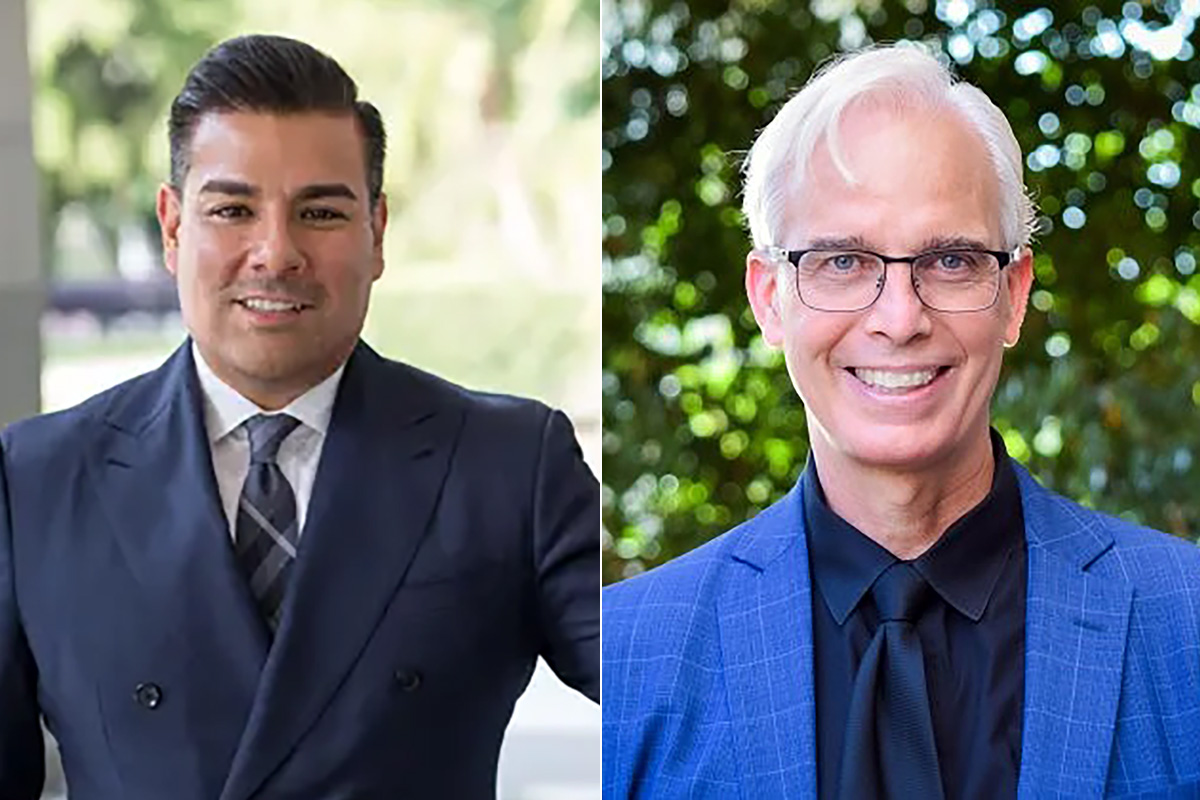
The LGBTQ+ Victory Institute on Saturday inducted California Insurance Commissioner Ricardo Lara and West Hollywood Vice Mayor John Heilman into its LGBTQ+ Political Hall of Fame.
The inductions took place during the Victory Institute’s annual International LGBTQ+ Leaders Conference in D.C.
U.S. Rep. Robert Garcia (D-Calif.), San Diego Mayor Todd Gloria, San Leandro Councilmember Victor Aguilar Jr., are among those who attended the conference. Evan Low, the LGBTQ+ Victory Institute’s president, served in the California State Assembly from 2014-2024.
Former state Senate President Pro Tempore Toni Atkins, former Assembly Speaker John Pérez, former state Sen. Christine Kehoe, former Palm Springs Mayor Ron Oden, Harvey Milk, a member of the San Francisco Board of Supervisors who was the state’s first openly gay elected official, and José Sarria, who ran for the San Francisco Board of Supervisors in 1961, have also been inducted.
National
Study shows ‘pervasive mistreatment of LGBTQ people by law enforcement’
Findings claim nationwide police misconduct, including in D.C., Va., Md.

The LGBTQ supportive Williams Institute, an arm of the University of California at Los Angeles School of Law, released a report last month citing multiple research studies conducted over the past 25 years showing past and “ongoing” mistreatment of LGBTQ people by law enforcement throughout the United States.
“Findings show that LGBTQ communities – particularly LGBTQ people of color, youth, and transgender and gender nonconforming individuals – have faced profiling, entrapment, discrimination, harassment, and violence from law enforcement for decades, and this mistreatment continues to be widespread,” according to a Williams Institute statement.
“Experiences of police mistreatment may discourage LGBTQ people from reporting crimes or engaging with law enforcement,” Joshua Arrayales, the report’s lead author and Williams Institute Law Fellow said in the statement.
“Reporting crimes is essential for accurate crime statistics, property allocation of crime prevention resources, and support services that address the unique needs of LGBTQ survivors,” he said.
The 59-page report cites the findings of two dozen or more studies and surveys of LGBTQ people’s interaction with police and law agencies for the past 25 years through 2024 conducted by various organizations, including the ACLU, the National Coalition of Anti-Violence Programs, the Williams Institute, and local government agencies.
But the report does not provide a breakdown of where police abuse against LGBTQ people occurred by specific police departments or locations. Instead it provides survey research findings of large groups of LGBTQ people who responded to a survey in different locations of the U.S.
Among other things, those surveys have found “LGBTQ people are more likely than non-LGBTQ people to report being stopped by police, searched by police, arrested, and falsely accused of an offense,” the Williams Institute statement accompanying the report says. “LGBTQ people also report substantial rates of verbal harassment, physical harassment, sexual harassment, and assault,” it says.
The report itself cites surveys of LGBTQ people’s interactions with police in D.C., Baltimore, and Virginia but does not give specific cases or identify specific police departments or agencies.
“A 2022 study based on interviews with 19 Black transgender women from Baltimore and Washington, D.C. identified a theme of re-victimization while seeking help from police,” the report says. “One participant noted that male officers asked what she did to cause her own abuse,” according to the report.
“Other participants expressed that when a knowledgeable officer was present, such as an LGBTQ+ liaison, they felt more inclined to reach out for help,” it says.
The report also states, “A 2024 study based on interviews with 44 transgender people in Virginia documented two instances of transgender women being pulled over for broken tail lights and then being mistreated once officers discovered they were transgender based on their IDs.” The report does not reveal the specific location in Virginia where this took place.
Other locations the report cites data on anti-LGBTQ conduct by police include New York City, Chicago, Los Angeles, Palo Alto, Newark, N.J., and Austin and San Antonio in Texas.
The full report can be accessed at williamsinstitute.law.ucla.edu.
West Hollywood
Administration refused to honor World AIDS Day; residents gathered with defiance, grief and love
Yesterday, members of the APLA Health Writers Group read moving stories to a large group of locals gathered at the AIDS monument.
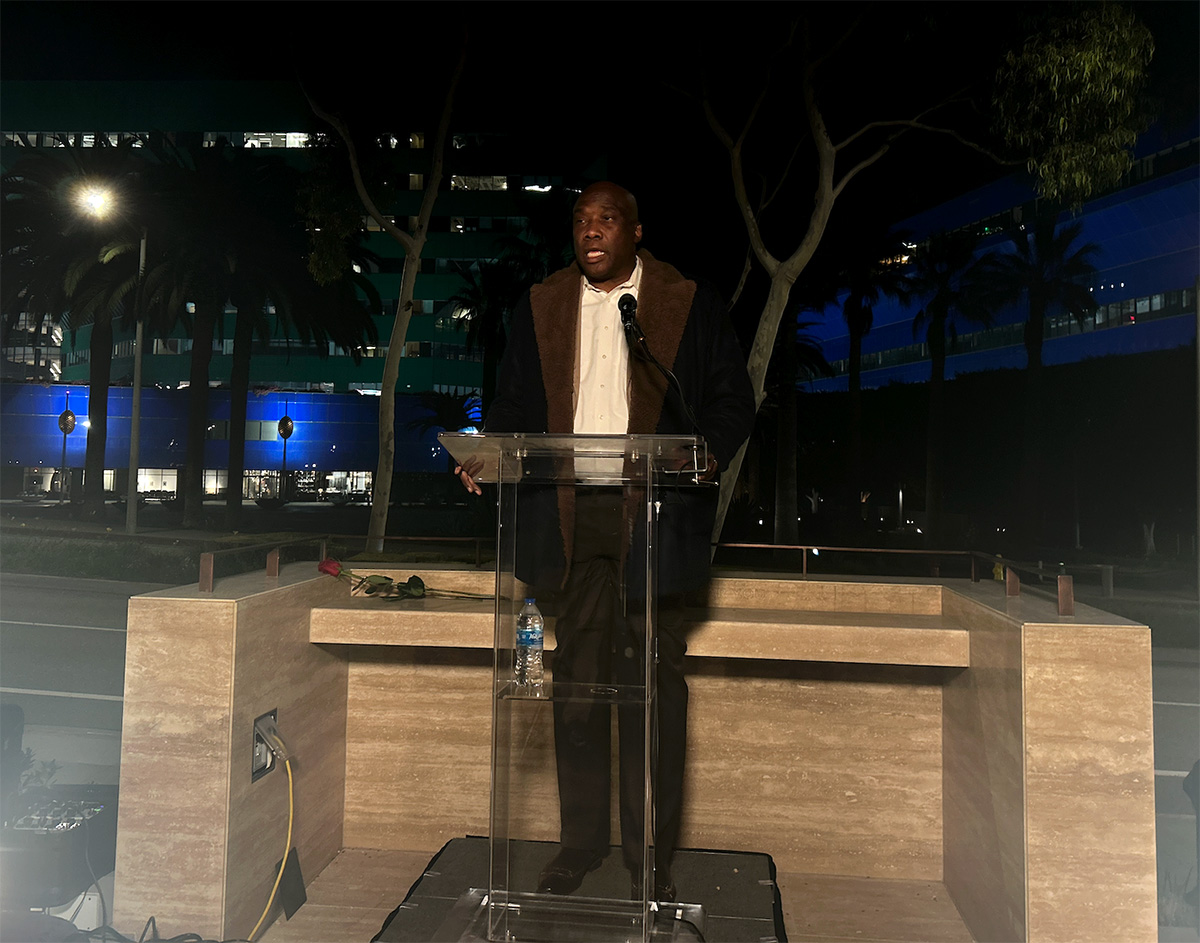
On Monday, the federal administration did not honor World AIDS Day, for the first time since the international awareness day was created in 1988. In addition to significant funding cuts to organizations focusing on HIV preventative treatment and care, the government’s halting of this commemoration perpetuates a dismissive system of inaction against LGBTQ+ people.
And yet, over 50 community members filled the empty spaces of West Hollywood’s AIDS monument yesterday evening, waiting in the night chill as city officials delivered impassioned statements and writers from APLA Health read personal pieces that centered a grief and love for those lost to the epidemic.

Before the readings began last night, West Hollywood vice mayor John Heilman asked for residents to join him in a righteous rage against administrative apathy. “I want to ask us all to reflect for just a moment about all of the people we lost…I want us to reflect and get angry,” said Heilman. “We have a fucking president who won’t even recognize World AIDS Day.”
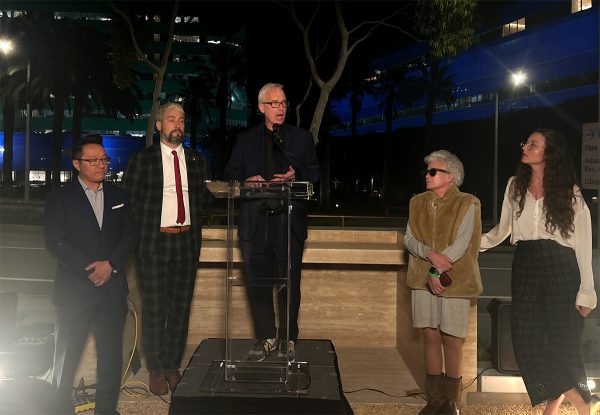
Irwin Rappaport, board chair for STORIES: the AIDS monument, echoed this immense disappointment. “Many of us here tonight lived through the 1980s, so we know what that’s like,” Rappaport said. “We also know that because of that neglect, because of that lack of caring from the federal government, we have to care for one another — and we know how to do that. When we don’t have recognition from others, we know how important it is to preserve our own history, to tell our own stories.”
Through heavy silence, five writers from APLA Health’s writers group stood tall before a podium and shared intimate writings they created about the epidemic and its personal impact on them. The collective was established in 1989 to provide an inclusive, expressive space for HIV-positive writers and allies to work on their writing and learn how to share their stories.
Writer Brian Sonia Wallace, who served as West Hollywood’s poet laureate from 2020 to 2023, has been working with the writers group for the last four years to help them hone and refine their narrative voices as they share their heaviest grief and the depths of their love for the people they lost to HIV and AIDS.
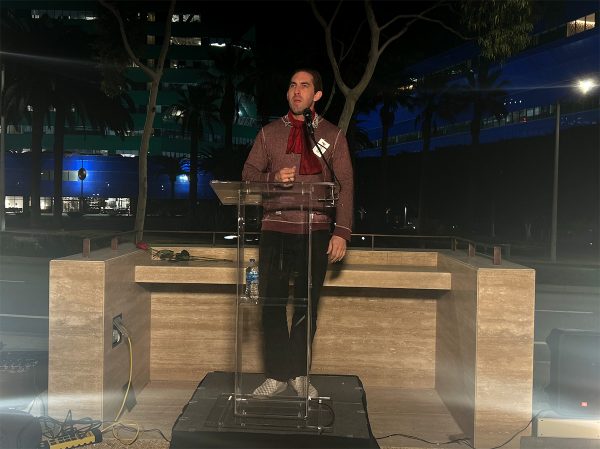
Hank Henderson, one of these writers, read from a diary entry from November 29, 1991. His voice, clear and strong, wavered as he shared about the death of his dear friend Richard. In a piece filled with lush, rich detail, painted clearly with a strong and loving voice, Henderson recounted a memory with Richard during the latter’s last years.
“The Santa Barbara sky is clear blue forever today…Yesterday came and went like a half-remembered dream between snooze alarms,” Henderson recited. “Last year, we walked to the beach. We spent hours there, played frisbee ourselves, brought the dog. Richard even yelled out 30-minute tanning turnover alarms. Yesterday, he took tiny, labored steps back to the car, used my shoulder to keep himself from falling over. Nobody said anything. We just pretend it’s normal.”
Another writer, Austin Nation, shared the story of being told he was HIV-positive at 26 years old. As a young nurse, he remembered the shock of seeing “young, beautiful men” arriving at the hospital covered in “purple, blotchy sores.” When he received his own test results, a paralyzing terror washed over his body. An incredulity followed the fear: why was this happening to him? “I got this thing for what?” Nation spoke. ”For having fun? For making love? And now it’s gonna cost me my life?”
But as he stood before the crowd, now 63 years old, he was met with applause and joy as he stated and repeated: “I’m still here. I’m still here.” The writers, in their grief and loss, have come to a place where they are able to share these stories, empowered and held. “In a world that writes off people with stories like mine,” Nation said. “It’s a hell of a good day to be alive.”
Kristie Song is a California Local News Fellow placed with the Los Angeles Blade. The California Local News Fellowship is a state-funded initiative to support and strengthen local news reporting. Learn more about it at fellowships.journalism.berkeley.edu/cafellows.
National
Faith leaders denounce anti-transgender attacks
‘You are holy. You are sacred. We love you.’

This past Trans Awareness Week, 10 heads of diverse religious traditions issued a statement proclaiming that transgender, intersex, and nonbinary people are worthy of love, support, and protection. Led by Rev. Dr. Sofía Betancourt, president of the Unitarian Universalist Association, representatives from the Universal Fellowship of Metropolitan Community Churches, The Fellowship of Affirming Ministries, the Union for Reform Judaism, the Presbyterian Church, the Christian Church (Disciples of Christ), The Episcopal Church, the United Church of Christ, and Reconstructing Judaism called out the violent and systemic persecution of trans, nonbinary, intersex, and queer people–proclaiming that their faith and their humanity urged them to affirm that trans, intersex, and quere people are “sacred” and “holy.”
Their statement comes at a critical time. Over the past three months, Trump and his Cabinet’s anti-trans rhetoric has only intensified, with a report released late September by journalist Ken Klippenstein in which national security officers leaked that the FBI is planning to classify trans people as “extremists.” By classifying trans people as “Nihilistic Violent Extremists,” far-right groups would have more “political (and media) cover,” as Abby Monteil reports for them, for anti-trans violence and legislation.
While the news is terrifying, it’s not unprecedented – the fight against trans rights and classification of trans people as violent extremists was included in Project 2025, and in the past several weeks, far-right leaders’ transphobic campaign has expanded: boycotting Netflix to pressure the platform to remove trans characters, leveraging anti-trans attack ads in the Virginia governor’s race and banning professors from acknowledging that trans people exist. In fact last month, two Republican members of Congress called for the institutionalization of trans people.
It seems that the government shutdown was predicated, at least partially, on Trump’s own anti-trans policies that were attached as riders in the appropriations bill.
It’s a dangerous escalation of transphobic violence that the Human Rights Campaign has classified as an epidemic. According to an Everytown for Gun Safety report published in 2020, the number of trans people murdered in the U.S. almost doubled between 2017 and 2021. According to data released by the Gun Safety report from February 2024, 34 percent of gun homicides of trans, nonbinary, and gender expansive people remain unsolved.
As Tori Cooper, Director of Community Engagement for the Transgender Justice Initiative for the Human Rights Campaign Foundation, this violence serves a purpose. “The hate towards transgender and gender expansive community members is fueled by disinformation, rhetoric and ideology that treats our community as political pawns ignoring the fact that we reserve the opportunity to live our lives full without fear of harm or death,” Cooper said.
The faith leaders came out in this statement to affirm that it is their spiritual and human imperative to call out this escalating violence and protect trans, nonbinary, intersex, and queer people. The leaders acknowledge that historically and today, religion is used as a weapon of hate to degrade and deny the human dignity of LGBTQ+ peoples. The Supreme Court is hearing Chiles v. Salazar, a case about the constitutionality of a Colorado ban of conversion therapy for minors, with the majority of conversion therapy practices being faith based. And despite the Supreme Court declining to hear a case challenging the constitutionality of same-sex marriage conferred in Obergefell v. Hodges, efforts to end marriage equality remain ongoing with Katy Faust’s End Obergefell movement.
“During a time when our country is placing their lives under increasingly serious threat,” the statement reads, “there is a disgraceful misconception that all people of faith do not affirm the full spectrum of gender – a great many of us do. Let it be known instead that our beloveds are created in the image of God – Holy and whole.”
The faith leaders argue that commendation of LGBTQ peoples and religiously motivated efforts to deny their dignity and rights is not the belief of all faith communities, and far-right Christian nationalist communities and others who uphold homophobia and seek to exact it writ large in the United States do not speak for all faith leaders.
This is a critical piece of the statement and builds on historical precedence. During the 1980s AIDS crisis, when far-right Christian leaders like Jerry Falwell, one of the founders of the Moral Majority, stated that HIV was “God’s punishment” for LGBTQ+ people and indicative of a broader moral decline in America, affirming faith communities came out to affirm the dignity and divinity of queer people. As funeral homes and churches refused to prepare the dead and bury them, some faith communities stepped up to say that these homophobic leaders do not speak on behalf of all people of faith.
In 1985, the United Church of Christ General Synod urged its member congregations to claim and declare themselves “Open and Affirming,” in order to express their welcome and support for LGBTQ+ people, and two years later, the Church of the Brethren issued a statement titled “A Call to Compassion” where conference members urged member congregations to speak out boldly against discrimination, provide direct care to people with HIV/AIDS, and actively educate themselves and others to stop the spread of fear and prejudice surrounding the disease.
Just one year later, the Evangelical Lutheran Church in America Church Council issued a statement, “AIDS and Church’s Ministry of Caring,” which outlined the ways in which welcoming, ministering to and advocating on behalf of people with HIV/AIDS is critical to their mission. Even the US Conference of Catholic Bishops, which earlier this month banned gender-affirming care at Catholic hospitals, issued a statement in 1987 calling discrimination against people with HIV/AIDS “unjust and immoral,” and denouncing the label of “innocent” or “guilty” patients.
Thus, the faith leaders’ statement this past week builds on a rich history of faith communities fighting the stigma that far-right faith groups perpetuate about LGBTQ+ people and committing to action. What sets this latest statement apart is its decidedly interfaith heart, which speaks to the history of the Pride Interfaith Service in Washington, DC that was first started by a group of faith leaders and lay people who gathered at the AIDS Memorial quilt.
As the statement reads, “Our scriptures vary, but they share a common conviction. As we make justice our aim we must give voice to those who are silenced. Our shared values, held across many faiths, teach us that we are all children of God and that we must cultivate a discipline of hope, especially in difficult times. As such, we raise our voices in solidarity to unequivocally proclaim the holiness of transgener, nonbinary, and intersex people, as well as the recognition of the entire spectrum of gender identity and expression.”
The statement ended by arguing that they need to call out the violence they are witnessing. Their silence, they argue, would be in compliance and reinforce the idea that homophobic religious leaders and lay people speak on behalf of all people of faith. Their statement is not only words, however, it is a written promise affirming the dignity and holiness of queer people but also to protect them in the face of increasing violence and persecution.
“When people of faith and conscience stay silent in the face of oppression, we are all made less whole. When people of faith and conscience speak out against that which violates the sacred in its own name, we have the power to stay the hand of sin. Transgender, nonbinary, and intersex people are vulnerable today,” the statement concluded.
“Our faiths, our theologies, and our practices of prophetic witness call on us to say with one voice to transgender people among us: ‘You are holy. You are sacred. We love you. We support you, and we will protect you.’”
West Hollywood
West Hollywood kicks off community-focused programming for World AIDS Day
Since 1988, queer communities have come together on Dec. 1st to honor siblings and allies lost to the AIDS epidemic.

Since 1988, LGBTQ+ communities have come together on Dec. 1st to commemorate queer siblings and allies lost to the AIDS epidemic. This year’s World AIDS Day follows the theme “Overcoming disruption, transforming the AIDS response” and highlights the substantial funding cuts to research, health services, and community initiatives that have prioritized the safety of people with HIV and AIDS. The theme challenges people to think about “radical” ways to organize together and ensure that those who are impacted are able to access the care, treatment, and awareness that they need.
Beginning today, the City of West Hollywood is kicking off programming to recognize the historical transformation that local queer communities experienced during the AIDS epidemic. A panel from the AIDS Memorial Quilt will be available for viewing at the City’s Council Chambers at 625 N. San Vicente Boulevard through Monday, Dec. 15th.
Known as the largest community arts project in history, the Quilt is a powerful memorialization of loved ones who died during the epidemic. Each panel of the Quilt contains a story of remembrance, immortalizing a life cut short during the crisis. The project currently contains over 50,000 panels dedicated to over 110,000 people, all woven together in a 54-ton tapestry piece.
If you’re visiting the panel today, there will be an additional gathering opportunity tonight at the West Hollywood Park for STORIES: the AIDS Monument. From 5:30 to 8:30 p.m., members from the HIV-positive writers collective APLA Health Writers Group will present intimate readings that reflect on their experiences. Community members will be allowed time to wander through the monument and also preview the new Herb Ritts: Allies & Icons exhibition at ONE Gallery after the program. The art show includes striking black and white portraits of activists who stood in alliance with those most impacted during the AIDS epidemic.
Additionally, fresh flowers will be placed on the bronze plaques that line the City’s AIDS Memorial Walk. During the AIDS epidemic, West Hollywood was at the center of a rampant grief and loss that juxtaposed vibrant programming and efforts that boosted healing and fought against stigma and violence. It continues to be a vibrant space that houses various organizations and memorial spots that continue to uphold the revolutionary history and advocacy work that has continued since the epidemic’s beginnings.
Today, West Hollywood is in the process of executing its HIV Zero Strategic Plan, an initiative that began in 2015. Its goals include: expanding healthcare access for people living with HIV and AIDS, reducing the rate of infections, lessening health disparities and inequities for those impacted, and slowing the disease’s progress from advancing to AIDS.
According to West Hollywood mayor Chelsea Byers at a recent Cityhood event, the initiative carries forth the City’s “bold vision” and commitment to ensuring marginalized community members living with HIV do not face the life-threatening discrimination and health barriers that their elders experienced.
To learn more about the City’s programming, read here.
Kristie Song is a California Local News Fellow placed with the Los Angeles Blade. The California Local News Fellowship is a state-funded initiative to support and strengthen local news reporting. Learn more about it at fellowships.journalism.berkeley.edu/cafellows.
West Hollywood
Today, West Hollywood celebrates 41 years of queer cityhood
WeHo’s city officials are trying to preserve the fight for queer safety and rights that began decades before.

On Nov. 29th, 1984, West Hollywood was incorporated as an independent City, making its sovereignty official and solidifying it further as a sanctuary for LGBTQ+ community members, their stories, and their freedoms. Inspired by other prominent gay neighborhoods like New York’s West Village and San Francisco’s Castro District, West Hollywood was established by local queer advocates and residents. Their first city council was made up of a majority gay governing body — the first in the world, according to the West Hollywood History Center.
This political legacy, and the city’s vibrant and proudly queer history, continues to be preserved. On Monday’s celebratory event, West Hollywood mayor Chelsea Byers announced that the City’s current council “continues to be a majority-LGBTQ+ body,” holding tightly onto a “spirit” that reflects, prioritizes, and fights for Los Angeles’ queer community.
West Hollywood has been through various transformations, cocooning and revitalizing itself through the country’s evolving political and cultural upheavals. It has long been home to a ravishing nightlife that celebrates LGBTQ+ expression, and was a focal point for queer-led liberation and activism in the late 1960s and early 1970s. Trailblazers like Morris Kight led the first gay pride march through West Hollywood’s streets in 1970 and opened the Los Angeles LGBT Center to nourish the City’s robust and blossoming queer communities.
Today, West Hollywood continues to be the place where queer organizers and residents plant roots. Earlier this month, STORIES: the AIDS monument opened up in the City’s park after over a decade of work, shining a light on the legacies of gay activists, artists, historians, and community members who fought to survive as anti-gay stigma led to the erasure of their rights and lives.
As waves of anti-LGBTQ+ hate and violence continue to surge through the country, West Hollywood elected officials aim to continue doing the critical work that began decades before them: the work that protects the ability of queer residents to advocate for themselves, to live with protections and dignity, and to relish in joy. Mayor Byers is inspired by the resilience of the community members who stood together to establish this independent City in 1984. “The people who lived here…wanted a city with strong protections for renters, with progressive policies, and with a local government that would actually reflect and protect the people who call this place home,” said Byers, at the Nov. 24th celebration.
Over 40 years later, these needs have not changed. The way forward? Remembering and fighting for that initial promise and hope. “We are a chorus. We are a tapestry,” said Byers. “We are the product of thousands of people who, for more than four decades, have dared to say: We can build something better here.”
Kristie Song is a California Local News Fellow placed with the Los Angeles Blade. The California Local News Fellowship is a state-funded initiative to support and strengthen local news reporting. Learn more about it at fellowships.journalism.berkeley.edu/cafellows.
Crime & Justice
SoCal gay couple alleges Uber driver refused them service and “chased” them with a bat
Los Angeles attorney Brian Breiter is assisting the couple with civil claims against the driver and Uber, calling into question queer safety on rideshare apps.

Note: The couple’s names have been kept anonymous by their attorney to avoid retaliation from Uber. They will be referred to as “J.” and “D.”
On Saturday, Nov. 8th, J. and D. shared a kiss during their Uber ride in San Diego’s queer-friendly North Park neighborhood when, suddenly, their driver pulled off the freeway. When the couple alerted him that he had taken the wrong exit, the driver said he would be letting them out because he did not “support [their] kind,” according to J.
It was at this point that J. began to record the interaction. In a 21-second clip provided to the Blade, J. and D. can be heard questioning the driver why they are being told to leave the vehicle when they had not yet arrived at their destination. Stranded in unfamiliar surroundings late at night, the couple responded in shock when the driver replied: “Because I don’t support you.”
In the video, J. asked explicitly: “You don’t support gay people?” to which the driver said: “No.”
J. and D. allege that after pulling over, the driver stepped out, retrieved a bat from his trunk, and cocked it back as if to strike them. At this point, the couple bolted, frantically running while dialing for the police. They ducked behind cars, panicking and hiding while waiting for officers to arrive. “I haven’t experienced another time in my life where I would say that I really was in fear of dying,” D. told the Blade. “We were just hiding there, hoping that we were going to survive at that point.”
Since then, the couple has sought out Los Angeles attorney Brian Breiter to represent them in a civil claim against the driver and Uber. Breiter explains that he is in the process of drafting the lawsuit, which includes claims of intentional infliction of emotional distress and civil assault against the driver as well as claims of negligent hiring, screening and training against Uber.
Breiter told the Blade that since his office sent a representation letter to Uber, there has been minimal contact from the company — no concessions, apology or accountability.
But, a spokesperson claims they have taken one concrete action in the case.
“Everyone deserves to feel safe, welcome, and respected when using Uber. Hate has no place in our society, and we do not tolerate any form of discrimination on the Uber platform,” an Uber spokesperson wrote to the Blade. “As soon as this was reported to us, we banned the driver from the platform.”
While this bit of news has been “relieving” for J. and D., it does not necessarily signal Uber’s readiness to improve their hiring, screening or training guidelines to protect their LGBTQ+ riders. “Removing this one driver does not prevent this from happening again,” Breiter told the Blade. “Unless Uber implements meaningful safety measures and proper screening, LGBTQ+ passengers and the public at large remain at risk.”
In October 2023, Uber Mexico created an LGBTQ+ mobile training initiative to strengthen their non-discrimination policy — but it remains unclear whether this training has been implemented more widely throughout the platform.
LGBTQ+ safety on these rides continues to be an understated issue, and J. and D.’s stories are not singular. On online forums, queer people have long shared their experiences with harassment and discrimination based on their gender and sexual identities. They take to the internet to warn others, understanding that: when there is no systemic change, they must rely on one another to be heard and to protect their communities.
Today, J. and D. do not feel safe using Uber or other rideshare apps. They are constantly reassessing and second-guessting their behaviors in public, for fear of violence. “We’re both very traumatized over this incident. [Recently] we went to dinner and we didn’t want to hold hands in public,” said J. “Because when we did kiss in the Uber, this man hate-crimed us and chased us down the street…It has just been really overwhelming and emotionally and physically draining.”
Kristie Song is a California Local News Fellow placed with the Los Angeles Blade. The California Local News Fellowship is a state-funded initiative to support and strengthen local news reporting. Learn more about it at fellowships.journalism.berkeley.edu/cafellows.
Los Angeles
LGBTQ+ community calls out Radio Korea over host’s homophobic comments; station acknowledges but skirts accountability
On Nov. 3rd, Radio Korea host Julie An claimed that “gay people began the spread of AIDS” on a talk show broadcast by the station.
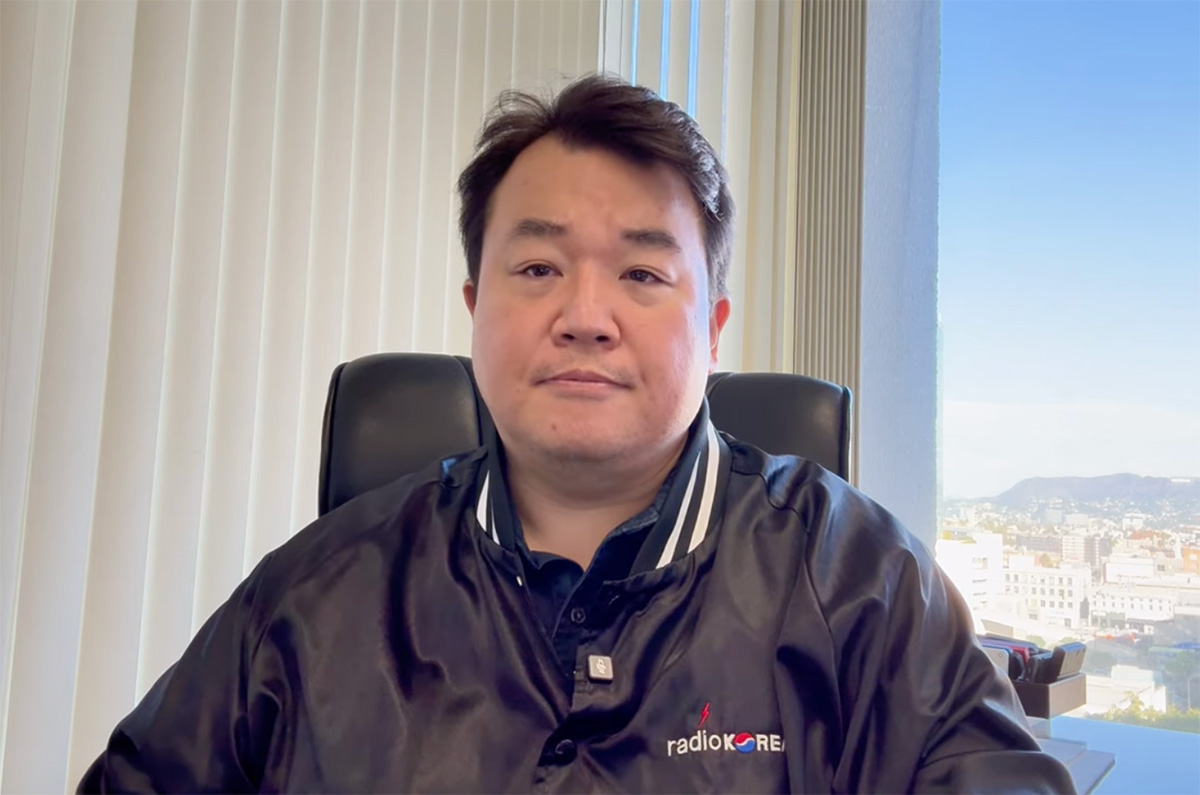
On Monday, Nov. 3rd, Radio Korea aired its regular morning talk show program, where one of its hosts, Julie An, discussed her lack of support for the LGBTQ+ community, citing her religious beliefs. She also went on to comment that gay people spread HIV and AIDS, and that conversation therapy — which has been linked to PTSD, suicidality, and depression — is a viable practice. Clips of this have since been taken down.
Radio Korea offers Korean language programming to engage local Korean American and Korean immigrant community members. Its reach is broad, as Los Angeles is home to the largest Korean population in the U.S, with over 300,000 residents. As An’s words echoed through the station’s airwaves, queer Korean community members took to social media to voice their concern, hurt, and anger.
In a now-deleted Instagram post, attorney, activist, and former congressional candidate David Yung Ho Kim demanded accountability from the station. Writer and entertainer Nathan Ramos-Park made videos calling out Radio Korea and An, stating that her comments “embolden” people with misinformation, which has the ability to perpetuate “violence against queer people.”
Community health professional Gavin Kwon also worries about how comments like An’s increase stigma within the Korean immigrant community, which could lead to increased discrimination against queer people and their willingness to seek health care.
Kwon, who works at a local clinic in Koreatown, told the Blade that comments like An’s prescribe being gay or queer as a “moral failure,” and that this commonly-held belief within the Korean immigrant community, particularly in older generations, strengthens the reticence and avoidance clients hold onto when asked about their gender or sexual orientation.
“When you stigmatize a group, people don’t avoid the disease — they avoid care,” Kwon explained. “They avoid getting tested, avoid disclosing their status, and avoid talking openly with providers. Stigma pushes people into silence, and silence is the worst possible environment for managing any infectious disease.”
For weeks, Radio Korea did not offer a direct response to the public criticism. Its Instagram feed continued to be updated with shorts, featuring clips of its various hosts — including An.
On Friday, Radio Korea CEO Michael Kim released an official statement on the station’s YouTube page. In this video, Kim stated that An’s comments “included factual inaccuracies” and that the station “does not endorse or share the personal opinions expressed by individual hosts.” Kim also stated that Radio Korea “welcomes members of the LGBT community to share their perspectives” in order to deepen understanding through dialogue.
Afterwards, Kim continued that though he acknowledges the “pain” felt by queer community members, he concluded: “I don’t think Radio Korea needs to apologize for what was said any more than Netflix should apologize for what Dave Chappelle says, or any more than Instagram or TikTok should apologize for what people say on their platforms.”
Kim then offered a justification that An’s statements were “not part of a news report,” and that he was “disappointed” that David Yung Ho Kim, specifically, had been vocal about An’s comments. Kim stated that he was the first person to interview David in 2020 during his congressional campaign, and that he had provided the candidate a platform and opportunity to educate listeners about politics.
“After all these years, the support Radio Korea has given him,” said Kim, “the support I personally gave him, even the support from other Radio Korea members who donated or even volunteered for him — he dishonestly tried to portray Radio Korea as being an anti-gay organization.”
Kim went on to criticize David’s purported “hurry to condemn others,” and also questioned if David has disowned his father, who he states is a pastor. “What kind of person is David Kim, and is this the kind of person we want in Congress?” Kim asked viewers, noting that Koreatown is “only about three miles from Hollywood, and some people just like to perform.”
At the end of the video, Kim stated that his duty is to guard the legacy of the station. “My responsibility is to protect what was built before me and ensure that Radio Korea continues serving this community long after today’s momentary controversies disappear,” Kim said.
For community members and advocates, this response was unsatisfactory. “The overall tone of the statement felt more defensive than accountable,” Kwon wrote to the Blade. “Instead of a sincere apology to the LGBTQ+ community that was harmed, the message shifts into personal grievances, political dynamics, and side explanations that don’t belong in an official response.”
Kim’s portrayal of the criticism and calls to action by community members as a “momentary controversy” paints a clearer picture of the station’s stance — that the hurt felt and expressed by its queer community members is something that will simply pass until it is forgotten. An continues to be platformed at Radio Korea, and was posted on the station’s social media channels as recently as yesterday. The station has not outlined any other action since Kim’s statement.
Kristie Song is a California Local News Fellow placed with the Los Angeles Blade. The California Local News Fellowship is a state-funded initiative to support and strengthen local news reporting. Learn more about it at fellowships.journalism.berkeley.edu/cafellows.
Los Angeles
Forgetting queer pioneer Morris Kight is “impossible”: Advocates and friends share stories at remembrance
On Saturday, Nov. 22nd, Kight’s ashes were interred at Hollywood Forever Cemetery.

Over 50 people made their way to the rooftop chapel at Hollywood Forever Cemetery’s Gower Mausoleum on Saturday afternoon, taking in sweeping views of the city as a gentle wind began to envelop the space — a wind that some thought signaled the presence of Morris Kight. Hosted by local nonprofit AIDS Healthcare Foundation (AHF), this reception provided longtime friends, fellow activists, and anyone else impacted by Kight’s legacy with the opportunity to share some of their most memorable stories about the LGBTQ+ vanguard.

Kight died on January 19, 2003, after decades of leading peaceful, bold, and outspoken action against oppressive systems that targeted marginalized communities. As Congresswoman Maxine Waters declared at the remembrance event: “You have to be a hell of somebody to be memorialized 22 years after.”
Kight co-founded the Los Angeles LGBT Center in 1969, first known as the Gay Community Services Center, where so many queer youth and adults found the courage and empowerment to seek education, resources, and comfort. It became the place where they could fully embrace themselves.
At 19, AHF president Michael Weinstein found himself at the front steps of the Center, afraid but compelled. This is where his and Kight’s lives would intertwine, setting him on his own path of liberatory leadership. This first encounter and relationship “cemented” his identity, Weinstein told the crowd, after an arduous search for belonging and internal understanding.
The impact Kight had on Weinstein and innumerable other queer folks was not just a consequence of his work, but the purpose for it all. “We were his payment. We were his reward,” said Miki Jackson, Kight’s longtime friend and another instrumental voice in early LGBTQ+ movements. “Morris cared that we were loud enough, we were out enough, we were visible enough that a child in Kansas in elementary school would know about it. He cared about where people were wounded the most.”
Kight projected his voice in hopes it would reach those who were silenced, becoming the face of several important movements, including the Gay Liberation Front. He raised money for people with AIDS, co-founded the Stonewall Democratic Club, and pushed for L.A.’s first pride parade in 1970 — unabashedly fighting for the visibility of LGBTQ+ people as they were met with societal violence and rejection.

“The idea of forgetting a Morris Kight is basically impossible,” said Terry DeCrescenzo, one of the founders of the Gay Academic Union. She recounted fond memories with Kight, including a story tied with her roots of protesting. Together, they blocked the streets of Sunset and Larrabee and sang the civil rights anthem “We shall overcome.” At first, DeCrescenzo was in disbelief. “I thought, ‘I went to Catholic school for 17 years to sit on the sidewalk singing We shall overcome?’ And the answer is yes. He showed me a way of doing things — of approaching life — that I didn’t dream I was capable of. So I thank you, Morris. I love you. I miss you.”
Kight’s ashes have been officially interred at Hollywood Forever Cemetery, granting him a final resting place. In life, he built sites of belonging for queer people, and today, this ground joins a tender catalog of spaces that contains a trace of what his loved ones hope he is remembered for: the fierce kindness with which he led his life. His endless stories. His desire to be with and fight for the people he loved.
Saturday’s remembrance event also offered a moment of deep reflection for the future of local queer activism. “We’re what we have left,” said Jackson, a queer elder who marched alongside Kight in the country’s early days of LGBTQ+ protesting — and who paved a path for younger advocates like Congressman and Equality Caucus Chair Mark Takano to continue the fight. “May we honor Morris by carrying his fire forward until every LGBTQ+ person in this country can live safely, open and unafraid,” said Takano.
Kristie Song is a California Local News Fellow placed with the Los Angeles Blade. The California Local News Fellowship is a state-funded initiative to support and strengthen local news reporting. Learn more about it at fellowships.journalism.berkeley.edu/cafellows.
-

 Commentary3 days ago
Commentary3 days agoThe perfect storm: Our queer infrastructure is in crisis
-

 a&e features4 days ago
a&e features4 days ago“I should have been there”: A queer Korean adoptee finds healing with original family members
-

 a&e features5 days ago
a&e features5 days agoUltimate guide to queer gift giving
-
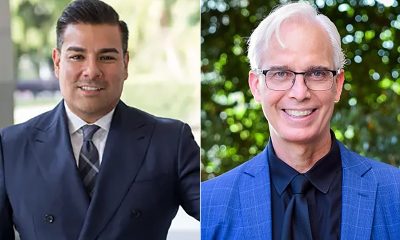
 California4 days ago
California4 days agoRicardo Lara, John Heilman inducted into Victory Institute’s Hall of Fame
-

 Television2 days ago
Television2 days ago‘Heated Rivalry’ is the gay hockey romance you didn’t know you needed
-
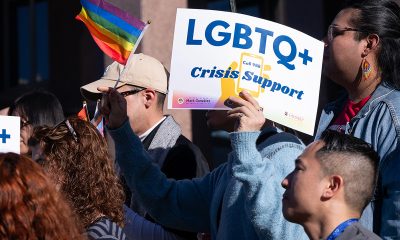
 LGBTQ+ Youth Mental Health3 days ago
LGBTQ+ Youth Mental Health3 days agoL.A. County officials advocate to reinstate “Press 3” crisis hotline for young queer people
-

 Golden Globe Awards5 days ago
Golden Globe Awards5 days agoCynthia Erivo, Eva Victor, and ‘Blue Moon’ bring queer representation to Golden Globe film nominations
-

 Commentary2 days ago
Commentary2 days agoLove in the time of porn: a glimpse into the dating life of an adult performer
-

 Los Angeles17 hours ago
Los Angeles17 hours agoRecent L.A. County report reveals record number of hate crimes against transgender and nonbinary community members
-

 Music & Concerts18 hours ago
Music & Concerts18 hours agoSalina EsTitties and GMCLA are primed and ready for this weekend’s ‘Holiday Legends’






